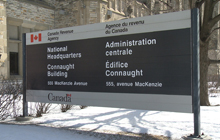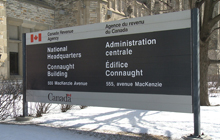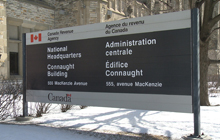How effective is the CRA at closing Canada’s tax gap?

How good is the Canada Revenue Agency at closing the tax gap? We’ll find out this year from the Parliamentary Budget Office if the CRA has indulged in PR spin.
TORONTO – Last week, two news stories from the Canada Revenue Agency (CRA) came across the wire and were widely reported. Ironically, the big hoopla was the non-story of three search warrants being executed nationwide related to the Panama Papers document release. They took place in Vancouver, Calgary and Toronto, so all regions of the country can feel good about the CRA enforcement action.
The other story, not released by the CRA but announced in Parliament, was that under threat of court action from the Parliamentary Budget Office (PBO), the CRA was finally releasing the so called tax gap information to the PBO. The tax gap, in effect, measures the size of the tax loss to the underground economy. Importantly, CRA has fought its release for years.
The CRA has said repeatedly that the underground economy is a major target of CRA tax investigation. Given that the tax gap information will help monitor how effective the CRA is in its black money blitz, one suspects that the information when finally available will not show it as being especially effective.
So, what is the reality of the CRA versus the PR spin it generates?
Tax prosecutions do take place and are publicized. But there is not a large volume of tax charges and many are of tax protesters, a major focus (rightly so) of CRA prosecution zeal. The tax protest “movement” sells, literally, often with a multi-level marketing type structure, absurd theories why Canadians, like their U.S. counterparts (where the movements originated), are not obligated by law to pay taxes. Their argument is that the government holds no dominion over them and therefore, cannot enforce paying of taxes.
Let’s take a look at the hard numbers. There were three tax convictions press releases recently. One was of a tax preparer who falsified deductions for his clients, the other two were tax protesters. Prior to tax prosecutions commencing, search warrants are typically executed and, except for the recent Panama Papers searches, they are not publicized.
Search warrants are extremely disruptive of a taxpayer’s business and life. Documents and computers are seized from the taxpayer and his accountants. This is where hiring tax lawyers is a big advantage over tax accountants, largely due to lawyer-client privilege. Seized records are typically kept for months verging on years.
If we are consulted before any raids and there is a serious risk of prosecution, it is generally obvious to us that a search warrant will be issued, so we advise our clients to back up all computers and records and to store the back-ups in a secure location unknown to CRA. This will allow clients to continue to operate with minimal disruption to the business.
After the CRA investigator has had a chance to review all of the records, a recommendation to prosecute will generally be issued, followed by charges and a trial. So how often does this happen?
There are no statistics that I have seen for cases that are investigated but not prosecuted. I have been involved in cases where we have persuaded the CRA not to prosecute even though I think a prosecution would have been successful.
I have been told, anecdotally by a former CRA auditor, that CRA investigators are reluctant to investigate files referred by auditors unless they are almost certain of conviction.
Whatever the reason, the latest year’s published CRA statistics show there were only about 35 convictions. There are some 25 million personal tax filers, plus corporate and trust filers. So, what are CRA’s real results?
Of course, prosecutions are not the only tax enforcement activity undertaken by CRA. Non-prosecution tax audits, which may result in gross negligence penalties, are routine.
Last week, CRA announced that they had audited restaurant wait staff in P.E.I. This is far from the first restaurant audit program. The construction and renovation sectors are also frequent targets of specialized audit projects.
How effective are these programs? Like in the 1996 film, Jerry Maguire, “Show me the money!” We’ll probably know by the end of the year CRA’s real results versus PR posturing.
David J Rotfleisch, CPA, JD, is the founding tax lawyer of Rotfleisch & Samulovitch P.C., a Toronto-based boutique tax law firm. With over 30 years of experience as both a lawyer and chartered professional accountant, he has helped start-up businesses, resident and non-resident business owners and corporations with their tax planning, with will and estate planning, voluntary disclosures and tax dispute resolution including tax litigation. Visit www.Taxpage.com and email David at david@taxpage.com









(0) Comments